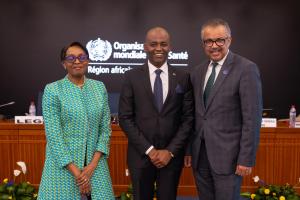Dr Faustine Engelbert Ndugulile has been nominated as the next Regional Director for the World Health Organization (WHO) African Region, taking the reins from Dr Matshidiso Moeti, who has served two five-year terms at the helm.
African Member States voted to nominate Dr Ndugulile during the Seventy-fourth session of the WHO Regional Committee for Africa, held in Brazzaville, Republic of the Congo. Other candidates were Dr Boureima Hama Sambo (proposed by Niger,) Dr Ibrahima Socé Fall (proposed by Senegal) and Dr Richard Mihigo (proposed by Rwanda).
Dr Ndugulile’s nomination will be submitted for appointment by the 156th session of the WHO Executive Board, which takes place in February 2025 in Geneva, Switzerland. The newly appointed Regional Director will take office thereafter for a five-year term and be eligible for reappointment once.
In his acceptance remarks, Dr Ndugulile expressed commitment to advancing health of the people of the region. “I’m truly honoured and humbled to be elected to the position of WHO Regional Director for Africa. I thank Member States for the trust shown in me. I promise to work with you and I believe that together we can build a healthier Africa,” said Dr Ndugulile.
Dr Tedros Adhanom Ghebreyesus, WHO Director-General, congratulated Dr Ndugulile on his election as Regional Director for Africa, and praised Dr Sambo, Dr Fall and Dr Mihigo on their campaigns.
“Dr Ndugulile has earned the confidence and trust of the Member States of the region to be elected the next Regional Director for WHO Africa. This is a great privilege, and a very great responsibility,” said Dr Tedros. “I and the entire WHO family in Africa and around the world will support you every step of the way.”
Dr Tedros also thanked Dr Moeti, the outgoing WHO Regional Director, for 10 years of commitment and excellence in service of the countries and people of Africa.
“I thank my sister Dr Moeti for everything she has done for the health of the people of Africa, but also for who she is,” said Dr Tedros. “I thank her for the example she has set, and the legacy she has left.”
Dr Moeti congratulated Dr Ndugulile and wished him success. “I would like to congratulate you for being elected as the Regional Director for Africa. This is an extremely fulfilling role. Despite the many challenges, I know you will take the baton and go on to accelerate the gains already made, putting the health and well-being of the people of Africa at the centre,” said Dr Moeti.
World Health Organization







OTHER ARTICLES
Editorial — Prevent, inform, and act for women’s health in Africa
Kenya : Government Prioritises Maternal Health and Strengthens Support for Community Health Promoters
Strengthening pandemic prevention, preparedness, and response capacities in Senegal using the “One Health” approach